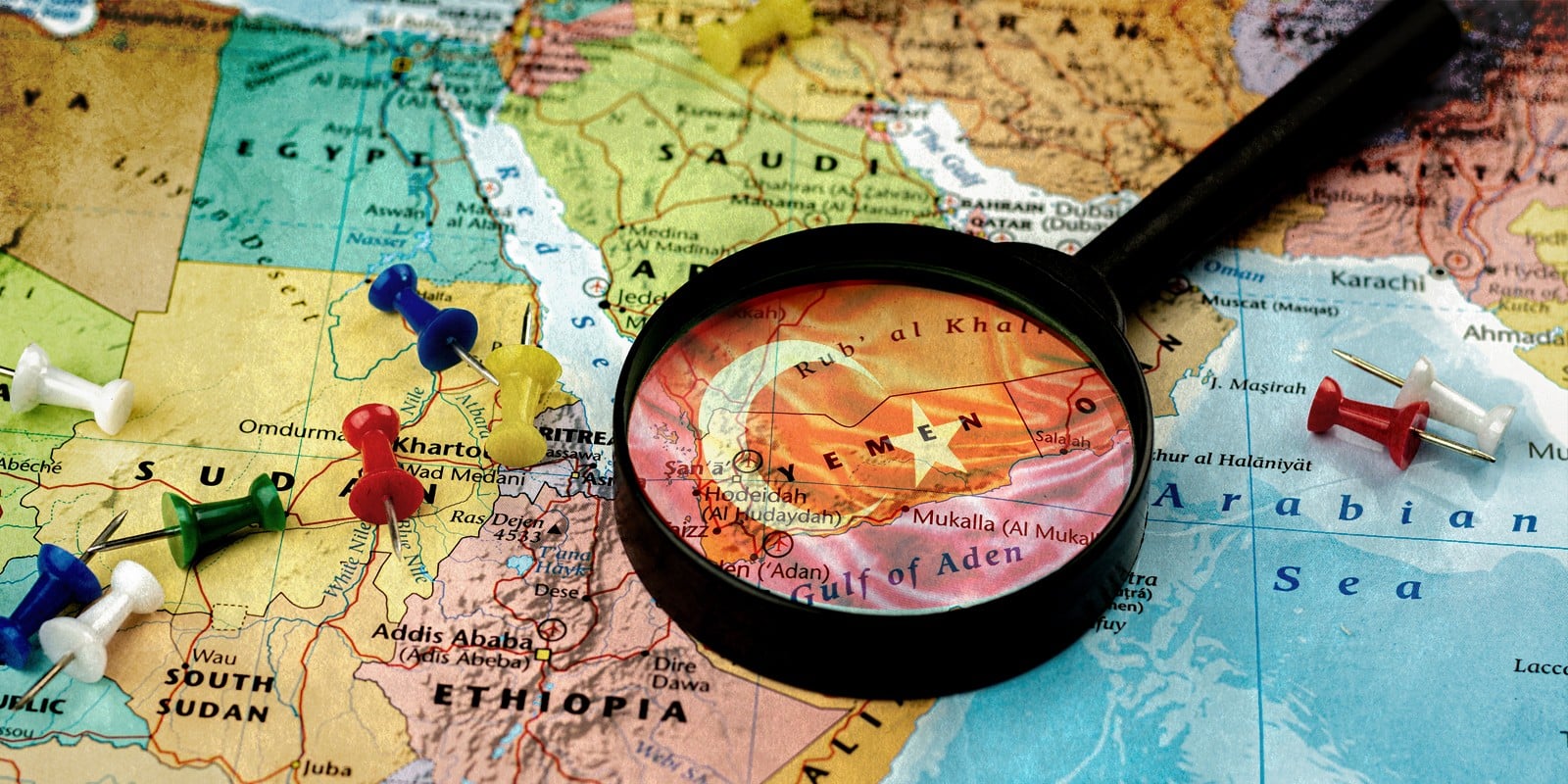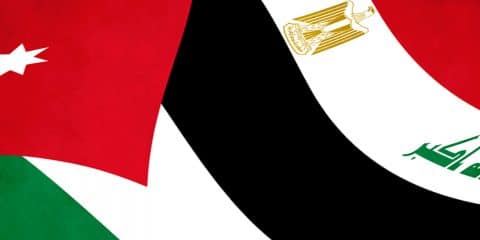Ankara’s military interventions in Iraq, Syria and Libya as well as its growing presence in the eastern Mediterranean constitutes a radical change in Turkish foreign policy. Its recent success in Libya demonstrates Ankara’s regional heft. Turkey’s next intervention is probably in Yemen.
Since Operation Euphrates Shield that was launched in 2016 against ISIS and the Kurdish PYD-YPG in northern Syria, President Recep Tayyip Erdoğan of Turkey has adopted a very aggressive, interventionist foreign policy. In his new foreign policy approach, Turkey has no hesitations about conducting military operations beyond its borders.
Ankara launched its first operations beyond its borders in neighboring countries, Iraq and Syria. Erdogan even ordered the Turkish Armed Forces (TSK) to stay in the seized territories. Turkey chose to build a security zone beyond its borders, to prevent its adversaries from operating inside Turkey. In other words, Turkey has embraced a doctrine of long-term military occupation. To strengthen its position in the newly occupied territories, Turkey has begun to invest in their infrastructure, by paving new roads, building hospitals and post offices, and providing equipment to schools and security forces.[1] Turkey also has begun to exploit resources in the occupied territories. During the darkest days of the 2018 economic crisis, for example, Turkey “brought” potatoes from northern Syria to lower the price of potatoes in its domestic market.[2]
Last year, after entrenching itself in northern Syria and Iraq, Turkey began expanding the scope of its military intervention to the broader MENA region.
Turkey’s “Blue Homeland” doctrine dictates expansion of its influence to the entire eastern Mediterranean, at the expense of Greece. Turkey signed an Exclusive Economic Zone (EEZ) treaty with Libya’s Muslim Brotherhood (MB) affiliated with the Libyan Government of National Accord (GNA), while ignoring the rights of Greece in the eastern Mediterranean. To ensure the agreement, Ankara then intervened militarily in the civil war in Libya. Thanks to the Turkish intervention, over the last six months the GNA managed to parry attacks of the Libyan National Army (LNA) led by Khalifa Haftar.
The GNA could not have succeeded without Turkey’s arm shipments from Mersin to the ports of Tripoli and Misrata.[3] These shipments provided the GNA with armed combat vehicles, cannons, howitzers, anti-aircraft guns, and armed Bayraktar UAVs. Subsequently, the LNA forces withdrew to city of Sirte. There are reports that Turkey is also drawing on Libyan oil, and that Turkish construction firms are involved in Libya’s reconstruction efforts.[4]
Turkey’s successful adventure in Libya is part of a network of activities in the MENA region. Since 2017 Turkey has inaugurated military bases in Somalia and Qatar and attempted to establish a naval base on Sudan’s Suakin Island. There are signs that Turkey intends to intervene in other theatres too. Yemen is likely to be the next theater of Turkish intervention, due to its strategic location.
As a predominantly Sunni country, Turkey already has declared its antagonism toward the Shiite Houthis (March 2015). President Erdoğan condemned the Houthi militias’ advancement and blamed Iran for seeking regional domination in the Middle East.[5] Despite the fact that Turkey, Saudi Arabia and United Arab Emirates (UAE) seemingly share the same vision for Yemen, they have failed to unite under one Sunni umbrella. The core reason for this is the ongoing rivalry between Turkey and Saudi Arabia for Sunni world leadership. Friction between the two peaked in 2018 when the Saudi journalist Jamal Khashoggi was murdered in the Saudi consulate in Istanbul. Since then Turkish-Saudi tensions have been out in the open.
Prior to the Khashoggi murder, Turkey enjoyed proper relations with the Saudi-backed Yemenite government headed by Abdrabbuh Mansur Hadi. From Hadi’s ascension to power in 2012 and until the Khashoggi murder, he had visited Turkey four times.[6] But given the deterioration in Turkish-Saudi bilateral relations, Ankara’s ties with the Hadi government have become strained.
The withdrawal of UAE support for the separatist Southern Transitional Council (STC) presented an opportunity for Turkish involvement in Yemen. On September 16, 2019 Erdoğan signalled his intention to intervene in the Yemen civil war. Even though the Turkish president spoke ambiguously and did not specify whether he wishes to act militarily or through soft power, he criticized Saudi Arabia and United Arab Emirates for not defeating the Houthis and turning the civil war into a humanitarian tragedy.[7]
Turkish press viewed Erdoğan’s statement on Yemen as signalling a new military intervention. Indeed, since September 2019 the Turkish press, mostly under Erdoğan’s control, has begun to prepare the public for another overseas adventure. The Anatolian News Agency started to allow more space for Yemen experts and NGO leaders to express their thoughts about the ongoing war in Yemen and a possible role for Turkey in that conflict.
For instance, on July 8, the Anatolian Agency quoted the Yemenite journalist Muhammed Al-Ahmadi that “while the UAE is igniting the whole region, Turkey is busy with extinguishing the flames.” In the same report Al-Ahmadi emphasized Turkey’s significant role in Yemen and implicitly invited Turkey to extinguish the Yemenite fire.[8]
A blunter invitation was offered by the head of the Muslim Brotherhood affiliated “Turkey-Yemen Association” Dr. Mohammed Humaykani on June 7 during a panel sponsored by the Muslim Brotherhood affiliated “Turkey-Yemen Association.” In his speech Humaykani underlined that the Yemenites are expecting a real partner and ally like Turkey to step into the war in Yemen. Humaykani also underlined and praised Turkey’s presence in Somalia and stressed that he would like to see the same sort of contribution also in Yemen.[9] On May 21, Yemen analyst Halid Aklan praised Turkey’s intervention in Libya and blamed the Saudis and the Emiratis for clumsiness in not being able to defeat the Houthis. Moreover, the analyst urged Yemenites to consider the Turkish option while looking at the concrete results in Libya.[10]
Public debate in Turkey over Yemen brought forward reports by media outlets such as Aden Press[11] and Ahval News[12] of Turkish meddling in Yemen. A Yemenite defector named Saleh Al-Jabwani (a former Yemenese transportation minister) is said to be cooperating with local Muslim Brotherhood branches and distributing money from Qatar.[13] Reportedly, Turkey has sent Al-Jabwani to Abyan and Shabwah provinces that are under control of the STC to recruit new fighters with Qatari money. Al-Jabwani is said to have established a recruitment center in the city of Ataq[14] and managed to recruit 600 fighters to be paid on monthly basis. Moreover, Al-Jabwani reportedly has bought weapons on the blackmarket such as four-wheel drive vehicles. (Turkey has not shipped arms to Yemen yet). Al-Jabwani also has formed relations with the Yemenite Muslim Brotherhood leader Hamoud Saeed Al-Mikhlafi, who also is recruiting new militia fighters against the Houthis. According to the same report, Al-Jabwani and Al-Mikhlafi are providing militants to the Hadi government’s Interior Minister Ahmad al-Maysari. In doing so, Turkey and Qatar jointly seek to increase their influence in the Hadi government at the expense of the Saudi government.[15]
Like its modus operandi in Libya, Turkey also has begun recruiting mercenaries in Syria for its new war in Yemen. The Turkish SADAT company again is playing a role in recruiting these mercenaries.[16] To further strengthen its position in Yemen, Ankara also is building relations with the Muslim Brotherhood’s Islah Party in Yemen.
Clearly, Turkey seeks to penetrate Yemen and exploit its natural resources, as well as secure a foothold on the Red Sea. By having a naval base in Yemen, Erdoğan will able to become a key player in the Red Sea and the Bab Al-Mandeb straits through which much of the oil from the Gulf is shipped to world markets.[17] Moreover, this will serve as Turkish leverage against Egypt. Such active Turkish support for the Yemenite branch of the Muslim Brotherhood may push the UAE back into Yemen and even may drive Egypt to become an active belligerent in Yemen, to contain Turkey.
Turkey also seeks to penetrate Yemen through soft power. Turkish governmental and non-governmental organizations such as the Turkish Humanitarian Relief Organization IHH[18], Turkish Cooperation and Coordination Agency (TIKA), Turkish Red Crescent and Turkish Directorate of Religious Affairs (Diyanet) play an active role in supplying humanitiarian, welfare and religious services to the people of Yemen. The most striking example of such “winning the hearts” activity took place during Ramadan. Turkish organizations sent food baskets to needy families in Shabwah, Hadramawt, Ma’rib, Aden, and the Taiz regions.[19] In fact, the Turks have long-term plans for Yemen. In January, deputy interior minister İsmail Çataklı paid a visit to Aden, and per Erdoğan’s instruction he produced a comprehensive report on the needs of the Yemenese people.[20]
A Turkish military intervention in Yemen is unlikely to receive wide public support. In the Iraqi, Syrian and the Libyan cases, Erdoğan justified Turkey’s presence there by emphasizing the importance of the interventions for pressing Turkish national security interests. The case for Turkish intervention in Yemen is more difficult to make. Therefore, even if Erdoğan decides to make Turkey into an active belligerent in Yemen, it is likely that he will use mercenaries instead of the Turkish Armed Forces. If successful, the Turkish president will be very eager to inaugurate a new army base in Yemen – to challenge the Egyptians, Saudis and Emiratis. The inauguration of a new Turkish army base will appeal to the Turkish people as a sign of a “strong Turkey.”
[1] “Suriye’ye duble yol”, Yeni Şafak, July 30, 2018, https://www.yenisafak.com/dunya/suriyeye-duble-yol-3386777 [Accessed: July 14, 2020]
[2] “Suriye’den patates aldık!”, Flaş Haber, June 28, 2018, http://www.flashaber.com.tr/ekonomi/suriye-den-patates-aldik-h29895.html [Accessed: July 14, 2020]
[3] “Turkey’s Ghost Ships – BBC Africa Eye documentary”, YouTube, March 26, 2020, https://www.youtube.com/watch?v=yW8f9ptdY_o [Accessed: July 14, 2020]
[4] “Türk müteahhitler Libya’ya gitmek için hazır”, Yeni Şafak, June 18, 2020, https://www.yenisafak.com/ekonomi/turk-muteahhitler-libyaya-gitmek-icin-hazir-3545477 [Accessed: July 14, 2020]
[5] “Erdoğan: “Yemen operasyonunu destekliyoruz”, Habertürk, March 26, 2015, https://www.haberturk.com/video/haber/izle/Erdoğan-yemen-operasyonunu-destekliyoruz/137682 [Accessed: July 14, 2020]
[6] “Türkiye – Yemen Siyasi İlişkileri”, MFA, http://www.mfa.gov.tr/turkiye-yemen-siyasi-iliskileri.tr.mfa [Accessed: July 14, 2020]
[7] “Cumhurbaşkanı Erdoğan: “Yemen’e ilk bombaları kimler attı?”, Haberler, September 16, 2019, https://www.haberler.com/cumhurbaskani-Erdoğan-yemen-e-ilk-bombalari-kimler-12431300-haberi/ [Accessed: July 14, 2020]
[8]“Yemenli araştırmacı gazeteci Ahmedi: Türkiye, BAE’nin bölgede çıkardığı yangınları söndürüyor”, Anadolu Ajansı, July 8, 2020, https://www.aa.com.tr/tr/dunya/yemenli-arastirmaci-gazeteci-ahmedi-turkiye-baenin-bolgede-cikardigi-yanginlari-sonduruyor/1903741 [Accessed: July 14, 2020]
[9] “‘Yemen Savaşı ve Uluslararası Toplum: Biz Nerede Duruyoruz?’ paneli”, Anadolu Ajanası, June 7, 2020, https://www.aa.com.tr/tr/turkiye/yemen-savasi-ve-uluslararasi-toplum-biz-nerede-duruyoruz-paneli/1868774 [Accessed: July 14, 2020]
[10] “Yemenliler, Türkiye’nin Libya müdahalesi ile Yemen’deki Arap Koalisyonunu kıyaslıyor”, Haberler, May 21, 2020, https://www.haberler.com/yemenliler-turkiye-nin-libya-mudahalesi-ile-yemen-13246678-haberi/ [Accessed: July 14, 2020]
[11] “Erdoğan seeks to repeat Libyan scenario in Yemen”, AdenPress, June 16, 2020, http://en.adenpress.news/news/23305 [Accessed: July 14, 2020]
[12]“Türkiye, Katar’ın finansmanıyla Yemen’de milis güç peşinde”, Ahval News, June 15, 2020, https://ahvalnews.com/tr/turkiye-yemen/turkiye-katarin-finansmaniyla-yemende-milis-guc-pesinde [Accessed: July 14, 2020]
[13]“Turkey sets its sights on Yemen”, Atalayar, June 22, 2020, https://atalayar.com/en/content/turkey-sets-its-sights-yemen [Accessed: July 16, 2020]
[14] “Qatar finances Turkish scheme to form militia in Yemeni province”, The Arab Weekly, June 15, 2020, https://thearabweekly.com/qatar-finances-turkish-scheme-form-militia-yemeni-province [Accessed: July 14, 2020]
[15] Qatar finances Turkish scheme to form militia in Yemeni province, The Arab Weekly, June 15, 2020, https://thearabweekly.com/qatar-finances-turkish-scheme-form-militia-yemeni-province [Accessed: July 16, 2020]
[16] “Türkiye, Katar’ın finansmanıyla Yemen’de milis güç peşinde”, Ahval News, June 15, 2020, https://ahvalnews.com/tr/turkiye-yemen/turkiye-katarin-finansmaniyla-yemende-milis-guc-pesinde [Accessed: July 14, 2020]
[17]“Suriye ve Libya’dan sonra şimdi de Yemen: Ülkeyi yeni krizlere sürüklüyorlar”, Bir Gün, April 21, 2020, https://www.birgun.net/haber/suriye-ve-libya-dan-sonra-simdi-de-yemen-ulkeyi-yeni-krizlere-surukluyorlar-297501 [Accessed: July 14, 2020]
[18] IHH is considered as a terrorist organization by Israel. The organizers of the Mavi Marmara flotilla.
[19] “‘Türkiye birçok alanda Yemen’e destek verdi'”, Anadolu Ajansı, March 29, 2019, https://www.aa.com.tr/tr/dunya/turkiye-bircok-alanda-yemene-destek-verdi/1433087 [Accessed: July 14, 2020]
[20] “Türkiye’nin Yemen’e müdahalesi Mısır’da endişe ile karşılanıyor” – Amr İmam, Ahval News, April 13, 2020, https://ahvalnews.com/tr/turkiye-yemen/turkiyenin-yemene-mudahalesi-misirda-endise-ile-karsilaniyor-amr-imam [Accessed: July 14, 2020]
JISS Policy Papers are published through the generosity of the Greg Rosshandler Family.
Photo: Bigstock









 - בניית אתרים
- בניית אתרים